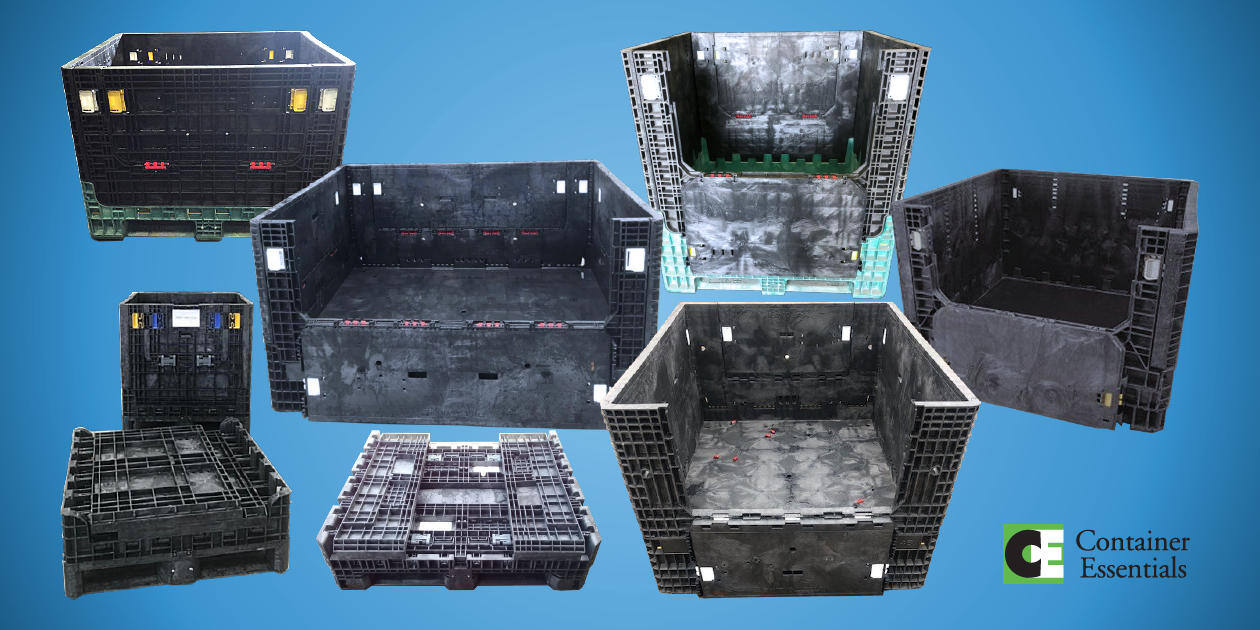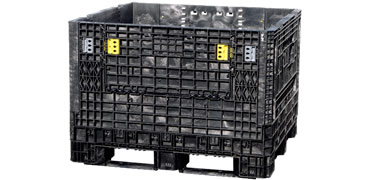The benefits of refurbished bulk containers in modern supply chain operations
Wiki Article
How Bulk Containers Can Improve Performance in Your Packaging Procedures
Mass containers play a crucial function in enhancing product packaging procedures. Their design makes it possible for far better usage of vertical room and promotes arranged inventory monitoring. This performance causes minimized product replenishment regularity and lower labor costs. Furthermore, the sturdiness of these containers decreases item damages. As organizations seek means to boost their procedures, comprehending the complex advantages of bulk containers comes to be vital. What other benefits might they give the table?Streamlined Storage Space Solutions
As business seek to enhance their operations, streamlined storage options have actually become important for improving product packaging effectiveness. Efficient storage not just saves room but also promotes quicker access to products, which is vital in busy production environments. Mass containers, created for very easy piling and company, significantly lower the intricacy of storage systems. They permit companies to make the most of vertical space while reducing the footprint required for inventory.Additionally, these containers often feature ergonomic styles that simplify handling and transport, decreasing the danger of injury and enhancing workflow. By consolidating products in bulk containers, business can reduce the regularity of restocking and streamline their supply chain procedures. Generally, the application of reliable storage space options fosters a more well organized workspace, causing enhanced productivity and decreased operational expenses. Through thoughtful layout and calculated use of mass containers, organizations can achieve noteworthy improvements in their packaging procedures.

Waste Decrease and Sustainability
While the search of performance commonly drives product packaging decisions, waste reduction and sustainability have actually arised as essential considerations in modern-day operations. Firms progressively identify that adopting mass containers can significantly minimize product waste. These containers commonly utilize less product packaging product than traditional approaches, leading to a smaller carbon footprint.Bulk containers can be recycled multiple times, which further reduces the need for single-use packaging and reduces general waste getting in land fills. Their layout frequently enables much easier recycling procedures, aligning with sustainability goals.
Additionally, business that focus on waste decrease can improve their brand name credibility, appealing to eco aware consumers. By implementing mass containers, organizations not only streamline procedures but also contribute favorably to ecological stewardship. This double advantage of functional effectiveness and sustainability settings companies positively in a competitive market significantly concentrated on eco-friendly methods.
Boosted Production Line Performance

Carrying out mass containers on production line considerably enhances effectiveness by streamlining the handling and transport of products. By using bulk containers, suppliers can decrease the frequency of material replenishment, permitting employees to focus on setting up tasks as opposed to continuous stock administration. This results in less disturbances and a smoother process, inevitably enhancing productivity.
Furthermore, mass containers are designed for very easy integration with automated systems, additionally optimizing the setting up procedure. Their standard shapes and sizes promote much better organization, making it possible for workers to find and gain access to products rapidly. This reduction in search time adds to a much more fluid production environment.

Expense Cost Savings and Boosted Revenue Margins
Noteworthy cost financial savings can be understood via the adoption of mass containers in packaging processes. By lowering the demand for numerous smaller bundles, business can decrease material expenses notably. Bulk containers commonly call for less packaging product overall, leading to reduced expenses on materials. Furthermore, the efficiency of bulk handling minimizes labor expenses associated with packing and unpacking, better boosting savings.Fewer trips to suppliers and reduced transportation expenses are also vital benefits, as mass containers permit raised product capacity per shipment. This greater quantity not only cuts down on delivery more info expenses but additionally maximizes storage area within facilities, bring about boosted inventory administration.
Moreover, the toughness of bulk containers frequently translates to decrease damages rates throughout handling and transport, protecting product stability and minimizing waste. Jointly, these aspects add to enhanced earnings margins, making bulk containers an economically helpful choice for services seeking efficiency in their product packaging operations.
Adaptability Across Industries
Bulk containers supply amazing flexibility across various sectors, making them a beneficial asset past just set you back financial savings. In the food and beverage market, these containers assist in the safe transportation and storage of large amounts of active ingredients, improving performance in assembly line. In pharmaceuticals, bulk containers guarantee conformity with rigid hygiene requirements while fitting the mass handling of resources. The chemical industry additionally advantages, as these containers withstand rough compounds and protect against contamination, supporting secure procedures. used collapsible containers. Furthermore, the agricultural industry makes use of bulk containers for carrying grains and plant foods, optimizing logistics and reducing waste. Their versatility expands to production, where bulk containers simplify assembly processes and minimize the demand for excessive packaging. This cross-industry functionality not just improves functional performance yet likewise advertises sustainability through lowered product packaging waste, showing the indispensable duty bulk containers play in contemporary supply chainsOften Asked Concerns
How Do Mass Containers Influence Employee Safety And Security in Product Packaging Procedures?
Bulk containers substantially boost employee safety and security in product packaging operations by reducing hands-on handling, minimizing injury risks, and advertising ergonomic methods. Their style assists in safer transportation and storage, eventually producing a more protected workplace for all workers.
What Products Are Mass Containers Generally Made From?
Mass containers are normally made from sturdy materials such as high-density polyethylene, metal, polypropylene, or wood - used bulk containers. These products give stamina, resistance to ecological elements, and viability for various contents, ensuring safe and effective transportation of goods
Can Bulk Containers Be Customized for Details Products?
Yes, bulk containers can be tailored for specific items. Makers commonly customize measurements, products, and features to meet one-of-a-kind requirements, making sure suitable protection and performance during storage and transport of different products.Exactly How Do Bulk Containers Affect Transportation Logistics?
Mass containers streamline transport logistics by maximizing freight room, decreasing the number of trips needed, and reducing handling costs (used collapsible containers). Their standardized measurements facilitate reliable packing and discharging, inevitably causing improved functional effectiveness throughout the supply chainWhat Is the Life-span of Bulk Containers in Regular Usage?
The life-span of bulk containers in routine use commonly ranges from five to 10 years, depending on worldly quality, handling methods, and environmental problems. Proper maintenance can significantly extend their usability and performance.Applying bulk containers on setting up lines substantially boosts efficiency by streamlining the handling and transportation of materials. Mass containers typically need less product packaging product on the whole, resulting in lower expenses on supplies. In drugs, bulk containers guarantee conformity with rigorous health requirements while suiting the bulk handling of raw products. Their adaptability expands to production, where mass containers simplify setting up processes and decrease the requirement for too much packaging. Mass containers considerably enhance worker safety and security in packaging operations by minimizing hands-on handling, lessening injury risks, and advertising ergonomic methods.
Report this wiki page